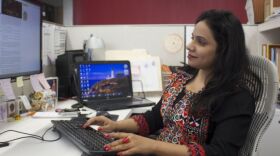Samreen Ghauri is a visiting journalist from Pakistan. KUT News asked Samreen to share her thoughts on the Taliban’s attack on a young Pakistani girl who was fighting to educate girls in her region.
The Taliban’s attack on 15-year-old Malala Yusuf Zia is symbolic of the battle between liberal, democratic forces and religious fundamentalism in Pakistan. Pakistani civil society – common people, liberal and bright-minded – stand together and strongly condemn this barbaric crime.
NPR reports that the Pakistani Taliban have claimed responsibility for the attack against Malala. NPR writes:
Pakistan's Dawn newspaper says it has been told by a spokesman for the Taliban that the girl was targeted for spreading "anti-Taliban and 'secular' thoughts among the youth of the area." Malala, Dawn says, was "hit by couple of bullets to her neck and head." While hospitalized, she is said to be "out of danger." She may, though, need to be sent overseas for treatment. The Taliban reportedly say they'll target her again.
"To seek education is duty of every Muslim man and woman," is the saying of Holy Prophet Muhammad (PBUH). With this latest attack, the Taliban’s claim they represent “true” Muslims again reveals them to be fascist, sick people – fundamentalists and enemies of Islam.
Malala, who advocated for girls’ education in the terror-infested tribal region of Swat, is the true face of Pakistan. The majority of the country, whether in urban or rural communities, despises terrorists like the Taliban. But we have to fight not only the Taliban itself, but the mindset of similar groups that want to enforce their beliefs and practices on others in the name of religion.
Women in Pakistan are brave and strong enough to stand up to the Taliban and their backward mindset. Women in Pakistan are striving to be recognized and earn a “thumbs up” for their achievements. They are doing everything from pumping gasoline and serving burgers at McDonald’s to running major corporations. They are taking part in politics, locally and nationwide. They are holding positions in public and private institutions. Around the world, practically whenever anyone talks about women in Pakistan, the very first topics are violence, discrimination, a violation of basic rights, gender subordination and more. Although those painful instances exist, there is also cause for hope.
The status of women in Pakistan varies considerably across class, region, and an rural/urban divide. This is due to uneven socioeconomic development and the impact of differing tribal, feudal, and capitalist societies on women's lives from place to place.
Some Pakistani women occupy high positions in politics. But in other rural areas of Pakistan, other women aren’t allowed to make any major life decisions, even for themselves.
The Pakistani women of today enjoy a better status than many women in the Muslim world. But a systemic subordination of Pakistan women still exists, although there have been attempts by the government and enlightened groups to elevate the status of women in Pakistani society.
The liberal, educated and bright-minded people of Pakistan strongly condemn the Taliban’s heinous act of terrorism. Groups like the Taliban underestimate the resolve and resilience of the people of Pakistan; it is time we further unite and stand up to fight the propagators of such barbaric mindsets and their sympathizers.
Pakistan is a liberal country where women are striving to become empowered in all spheres of life. This moment offers a critical juncture with which to challenge the antiquated customs that oppress women – narrow, dogmatic fundamentalist beliefs that foster discrimination, and may mislead Pakistan on its way to becoming a prolific, dynamic and liberal prosperous nation.
Our civilization must advance to become a better, progressive and secular Pakistan. That the only way forward we have.




